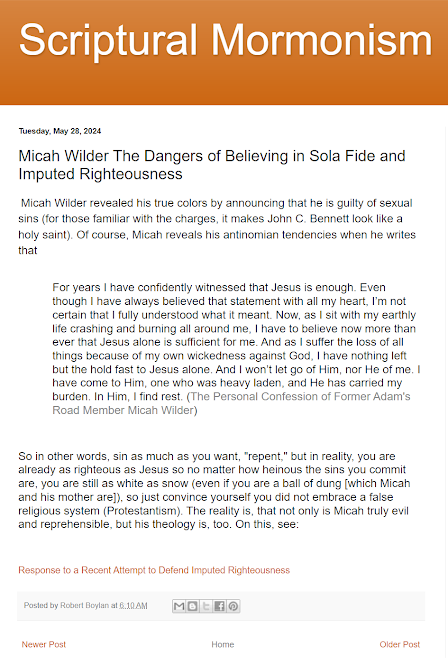Mormon apologetics: Appeals to theosis critically examined
Theosis or Apotheosis: Which is it?
Have you ever talked to a Mormon, either online or in person who quoted one of the early church fathers to support their belief that they can become a god in the next life?
If so, you're likely already aware that Mormons believe in a doctrine called 'eternal progression', and when speaking with Roman Catholics, Eastern Orthodox or Protestants/Evangelicals they will often claim that such a doctrine was taught by the early church fathers in their literature (Patristics), and is best known today as 'theosis'. This is then usually followed up with one or more quotations that in some cases, truly do seem to lend support to such a claim.
However, it must be pointed out that this is a false equivocation on the part of the Mormon and is by no means a novel tactic. (See this excellent article from Fred Anson on beggarsbread.org for more information)
The definition of theosis that Mormons functionally use is actually known as apotheosis and I shall quote a talk given in April 1995 by (at the time of this writing) a living Mormon apostle today; Dallin H. Oaks to prove the fact:
At 14:28-15:03 we hear the following from Oaks:
"Those who have met the highest requirements for this kingdom, including faithfulness to covenants made in a temple of God and marriage for eternity, will be exalted to the godlike state referred to as the "fulness" of the Father or eternal life. This destiny of eternal life or God's life should be familiar to all who have studied the ancient Christian doctrine of and belief in deification or apotheosis. For us, eternal life is not a mystical union with an incomprehensible spirit-god."In that last sentence, Oaks speaks about theosis as the Eastern Orthodox would understand it today. From that, it is apparent that he is obviously aware that apotheosis is NOT theosis. (However, he is incorrect in stating that this is an ancient Christian doctrine) In light of this, it paints the faithful Mormons arguing for theosis in a strange light, are they using the term in ignorance of what their leader called this belief over 25 years ago? Maybe so.
Another angle that deserves consideration, is the theological backdrop of eternal progression (apotheosis) and the critical components that must be accepted in-tandem in Mormonism:
A. There was a pre-existence (Gospel Principles chapters 2 & 3)
B. "In the beginning, the head of the Gods called a council of the Gods; and they came together and concocted (prepared) a plan to create the world and people in it." - Joseph Smith, King Follet Discourse
C. "Now, the word create came from the word baurau, which does not mean to create out of nothing; it means to organize; the same as a man would organize materials and build a ship. Hence we infer that God had materials to organize the world out of chaos—chaotic matter, which is element, and in which dwells all the glory. Element had an existence from the time He had. The pure principles of element are principles which can never be destroyed; they may be organized and re-organized, but not destroyed. They had no beginning and can have no end." - Joseph Smith, King Follet Discourse
D. God did not create matter or spirit/intelligences from nothing (ex nihilo) but instead organized existing matter (ex materia) to create. (Abraham 3:18-23)
Christians who know their Bibles would recognize that these are aberrant doctrines, even more so among those who are also familiar with church history & the views of the early church fathers.
Bearing these things in mind, Mormons arguing for theosis face 3 significant issues:
1. Apotheosis is NOT theosis. (They can take it up with Oaks himself if they still disagree)
2. Eastern orthodox who hold to theosis today, explicitly reject the Mormon spin they've attempted to put on it.
3. In Mormon thought apotheosis really cannot exist in isolation, let alone be believed. One must embrace the aforementioned doctrinal tenets above in order to have a fulness of the doctrine.
However, there is a 4th issue that warrants attention here, and that is what did the early church fathers actually believe in context? Given that we've already highlighted three problems, it would be unwise to assume that we can give our Mormon neighbors a bottomless benefit of the doubt here by assuming that their usage of these quotes is entirely fair, balanced & done with the utmost integrity.
Below is a list of the most commonly cited early church fathers by Mormons that other Christians & I have seen used online, as well as in some Mormon apologetic literature. I took it upon myself to research those specific quotations & detailing my findings in sub-articles (with many more forthcoming) that I hope, will provide significant clarity and help to dispel the #MormonMyth that such patristic quotations do not support Mormonism, but in fact they actually undermine it altogether.
"The one who states his case first seems right, until the other comes and examines him."
- Proverbs 18:17
(This section is a work in progress and will be updated over time)
Ante-Nicene:
Justin Martyr
Irenaeus of Lyons (coming soon)
Theophilus of Antioch
Clement of Alexandria
Tertullian
Hippolytus
Origen
Gregory Thaumaturges
Nicene and Post-Nicene:
Athanasius of Alexandria
Cyril of Jerusalem
Gregory of Naziansus
Basil of Cæsarea
Hilary of Poitiers
John of Damascus
Theodoret of Cyrus
Thalassios the Lybian
Maximus of Constantinople

